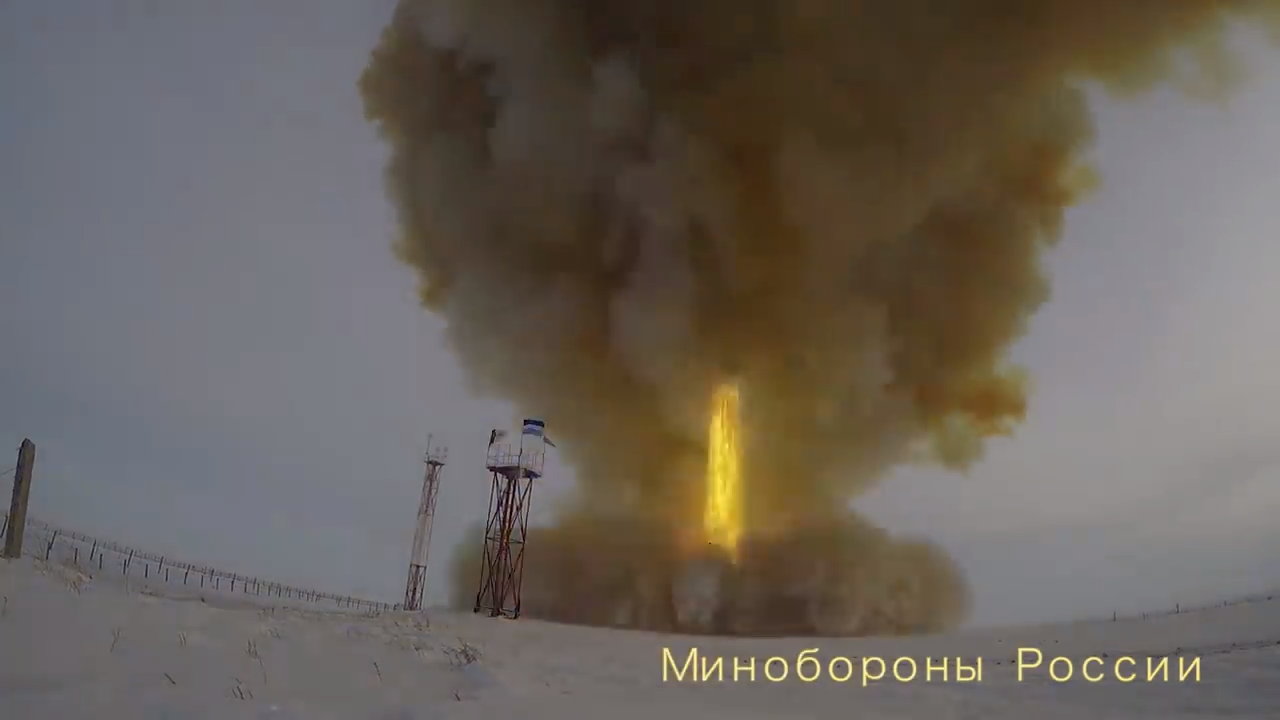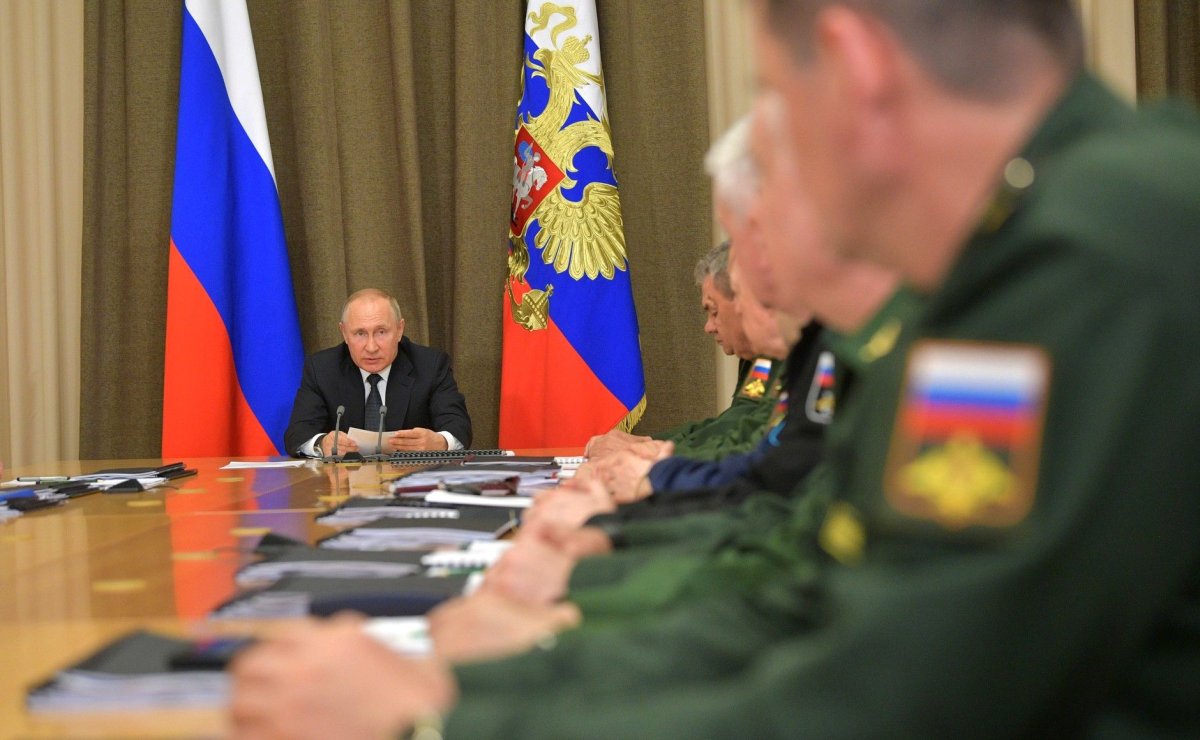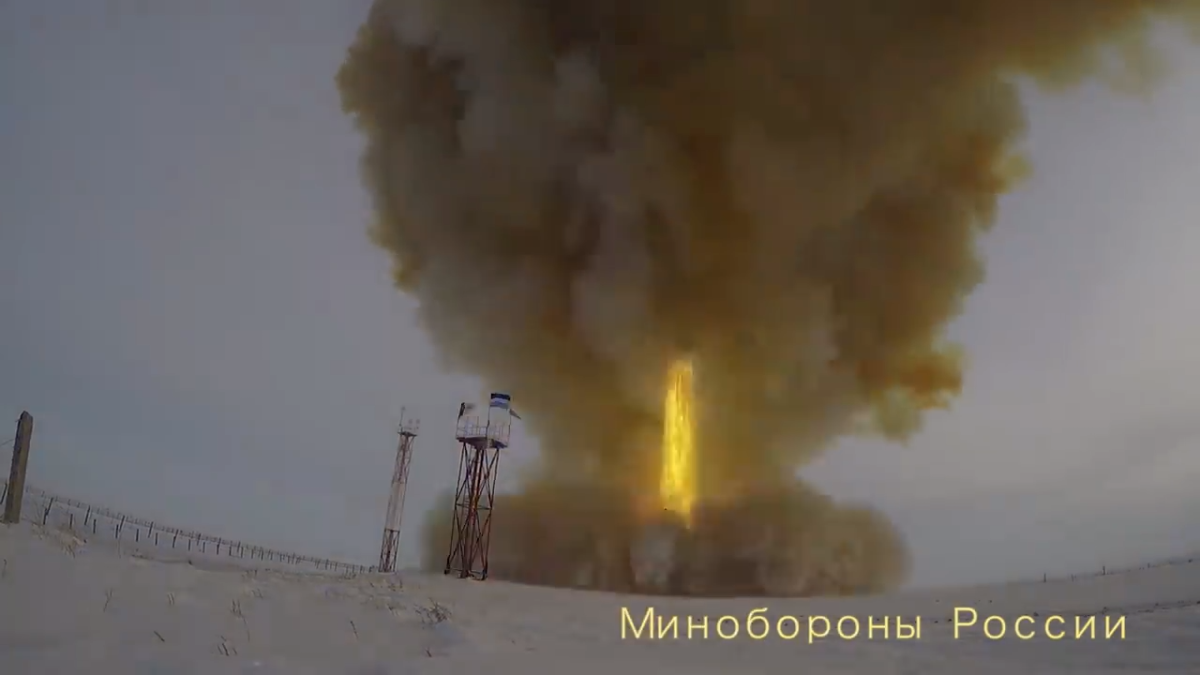
Russian President Vladimir Putin has called for the development of defenses against hypersonic weapons, a technology he has claimed only his country possessed, in order to prepare for other countries obtaining them.
Speaking Monday to the Russian Ministry of Defense and the heads of his country's defense industry, Putin praised recent advances in Moscow's military might, but warned that "changes in the world military-political situation that adversely affect regional and global security should be taken into account." Specifically, he discussed President Donald Trump's decision to leave the 1987 Intermediate-range Nuclear Forces (INF) treaty, which banned the deployment of land-based missiles ranging from 310 to 3,420 miles.
Among the measures that Putin called for was the "re-equipment of troops with the latest technology capable of effectively resisting a potential enemy's air attacks, including hypersonic ones." Such highly maneuverable weapons hit speeds of at least Mach 5, or five times the speed of sound, too fast for any existing defenses. As Putin argued, "We all know perfectly well that so far there are no such weapons in the world, no one else, except us, except Russia."
"But we also perfectly understand that sooner or later such weapons will appear in the leading countries of the world," Putin said. "It is better for us if it is too late for them. What does it mean, 'too late for them'? This means that the means of protection against these types of weapons should appear before hypersonic weapons are put on alert in those armies I have already mentioned."

Putin officially unveiled the development of a nuclear-capable hypersonic arsenal in March 2018, when he devoted his annual State of the Nation address to showing off such weapons as the Kh-47M2 Kinzhal air-launched ballistic missile and the Avangard boost glide vehicle, a device that Russia planned to fit to its new RS-28 Sarmat intercontinental ballistic missile, nicknamed Satan 2 by the West. Another submarine-launched hypersonic missile called 3M22 Tsirkon was confirmed by Putin during his follow-up speech in March of this year.
All of these weapons have undergone various rounds of testing, and the Kinzhal was said to have already entered service with a number of Mikoyan MiG-31K interceptor and attack aircraft. The U.S. has cast doubts on some of Russia's claims when it comes to its missile technology, but has scrambled to build hypersonic offense and defense of its own and has accused Moscow of actually underestimating the capabilities of another one of its missiles, the Novator 9M729, which Washington claimed breached the INF.
Russia has denied that the system breached the treaty's restricted limit and counterclaimed that the U.S. was already violating the INF due to its pursuit of a global missile shield including defense systems that could allegedly be used offensively as well. Two weeks after announcing the development of an ambitious plan to "detect and destroy any missile launched against the United States anywhere, anytime," Trump left the Cold War-era deal behind in February.
With the INF set to officially collapse in August, both sides have warned they were already looking into potential deploying short-range and intermediate-range weapons systems. While Trump warned his administration was "developing our own military response options and will work with NATO and our other allies and partners to deny Russia any military advantage from its unlawful conduct," Putin threatened not only to strike U.S. missile positions across Europe should they threaten Russia, but the Pentagon's "command centers" in the U.S. as well—something he and experts said could be done within minutes.

With the U.S. and Russia already at odds over a number of the world's leading issues—including a political crisis in Venezuela, escalating tensions over the 2015 Iran nuclear deal abandoned by the U.S. and a new Moscow-backed offensive against insurgents in Syria—the world's top two military powers have struggled to come together for talks. Secretary of State Mike Pompeo was set to travel to Moscow on Monday but instead went to Brussels to meet with European allies as frictions with Iran worsened.
That same day, Russian Foreign Minister Sergey Lavrov met with Chinese Foreign Minister Wang Yi. Moscow and Beijing, which was also in the process of developing ballistic missiles and defenses, have grown closer in recent years, sharing some common misgivings on Washington's growing global military presence and perceived hegemony in global affairs.
Asked about the current state of ties between the three countries, Wang said that "Sino-Russian relations have set an example for the international community" and the two "are willing to make compromises with world powers including the United States on the basis of mutual respect, strengthen cooperation, and strive for more peace, security and stability for the world." Lavrov concurred, adding, "The significance of relations between the great powers is not only for the peoples of these countries and the development of mutually beneficial cooperation, but also for the fate of the world."
Pompeo was set to travel Tuesday to Sochi to meet with Lavrov and Putin. Later on Monday, Trump told reporters that his top diplomat's "message is that there's never been anybody that's been so tough on Russia," though "it makes sense to get along with Russia." He also announced that he would meet also meet with Putin, as well as Chinese President Xi Jinping at the sidelines of next month's G20 summit in Japan.
Uncommon Knowledge
Newsweek is committed to challenging conventional wisdom and finding connections in the search for common ground.
Newsweek is committed to challenging conventional wisdom and finding connections in the search for common ground.
About the writer
Based in his hometown of Staten Island, New York City, Tom O'Connor is an award-winning Senior Writer of Foreign Policy ... Read more
To read how Newsweek uses AI as a newsroom tool, Click here.








